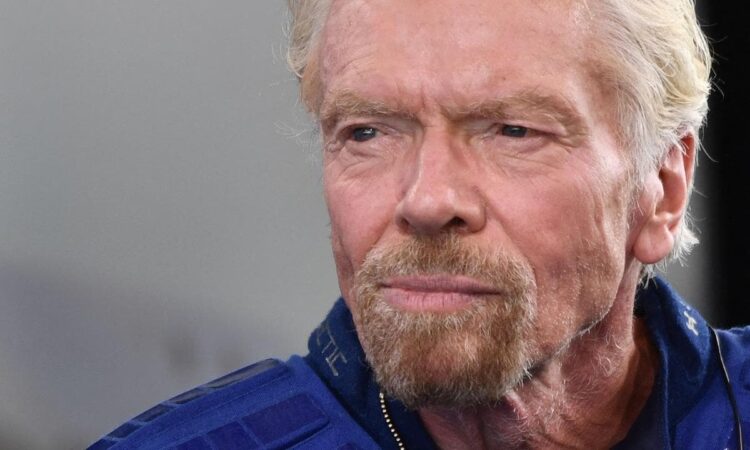The Virgin Galactic spacecraft carrying British billionaire Richard Branson, two pilots and three other passengers, reached space earlier this week. But now an argument has begun over whether he actually got to the finish line.
Branson, along with the passengers, were able to unbuckle and experience a few minutes of weightlessness, while admiring the curvature of Earth from the ship’s 17 windows.
RELATED: Richard Branson’s Virgin Galactic test flight reaches space
The Virgin Galactic SpaceShipTwo space plane Unity and mothership separate as they fly way above Spaceport America. Picture: Patrick T. Fallon/AFPSource:AFP
RELATED: Mystery bidder puts $36 million on space flight with Jeff Bezos
The boundary of space is defined as above 80km in altitude, according to NASA, which the 70-year-old passed by reaching a high point of 89km above the Earth’s surface.
Branson called it the “experience of a lifetime” noting it had taken 17 years of “hard work” to get the spacecraft into the air.
“What a day, what a day,” he said. “I dreamt of this moment since I was a kid, but nothing can prepare you for the view from space.”
Sir Richard Branson speaks after he flew into space aboard a Virgin Galactic vessel, a voyage he described as the ‘experience of a lifetime’. Picture: Patrick T. Fallon/AFPSource:AFP
Following the momentous achievement, fellow billionaires Elon Musk and Jeff Bezos reacted to the occasion.
Musk tweeted in response to a video of the mission: “Congratulations, beautiful flight!” While Bezos, who hoped to be the first billionaire to make it to the edge of space, said he “can’t wait to join the club” and plans to be the second to do so.
Bezos plans to take flight this month, just nine days after Branson’s mission. However the world’s wealthiest individual has an even more ambitious mission aboard his New Shepard rocket by going 100km above the Earth’s surface.
But the modern day space race has ignited an argument over whether, in fact, either mission should count as ‘space travel’.
The Virgin Galactic SpaceShipTwo space plane Unity returns to Earth. Picture: Patrick T. Fallon/AFPSource:AFP
Professor Andrew Coates, deputy director of the Mullard Space Science Laboratory at University College London, said in an interview with the The Telegraphthat despite the achievement being “amazing” it wasn’t “really space exploration”.
And Bob Smith, CEO of Bezos’ space company Blue Origin, said: “[The Branson expedition didn’t involve] flying above the Kármán line, and it’s a very different experience.”
While exact boundaries of space have been debated over the years, the general pinpoint is that the beginning of space is around 100km above sea level – known as the Kármán line.
If that ruling is what the race uses as the measure of success, then technically Branson fell short by 11km. However, if all goes to plan for Bezos’ mission – he will tip just over the invisible barrier.
Do we have a winner of the billionaire space race? Picture: Johannes Eisele/AFPSource:AFP
However, while the Fédération Aéronautique Internationale (FAI) Sporting Code for astronautics recognises only flights that exceed the Kármán line as qualifying to be an astronaut, in the United States, professional, military, and commercial astronauts who travel above an altitude 80 km are awarded astronaut wings.
What is the aim of Virgin Galactic?
SpaceShipTwo is a spaceplane designed to carry six passengers and two pilots.
It is carried aloft by a large aeroplane before breaking away and zooming to an altitude of about 99km.
In 2016, the late Professor Stephen Hawking unveiled Virgin Galactic’s second SpaceShipTwo craft, called VSS Unity, after the first SpaceShipTwo craft VSS Enterprise crashed during tests in 2014.
Blue Origin founder Jeff Bezos hopes to go 100km above Earth on July 20. Picture: Mandel Ngan/AFPSource:AFP
But Sir Richard Branson only made it to 89km above sea level. Picture: Don Emmert/AFPSource:AFP
Virgin Galactic is up against fierce competition in the private space race from firms such as Blue Origin and Elon Musk’s SpaceX.
Amazon founder Mr Bezos will be on board the suborbital flight of the New Shepard spacecraft on July 20.
According to Virgin Galactic, about 600 would-be citizen astronauts have already booked tickets for Branson-style flights, priced at about $US250,000 ($A337,000) each; eventually, they hope to reduce the price to $A54,000.
Mr Musk has previously said he plans to go to space on one of his company’s rockets but has not given a time frame for when he expects that to be.
trending in travel
Source: Read Full Article







